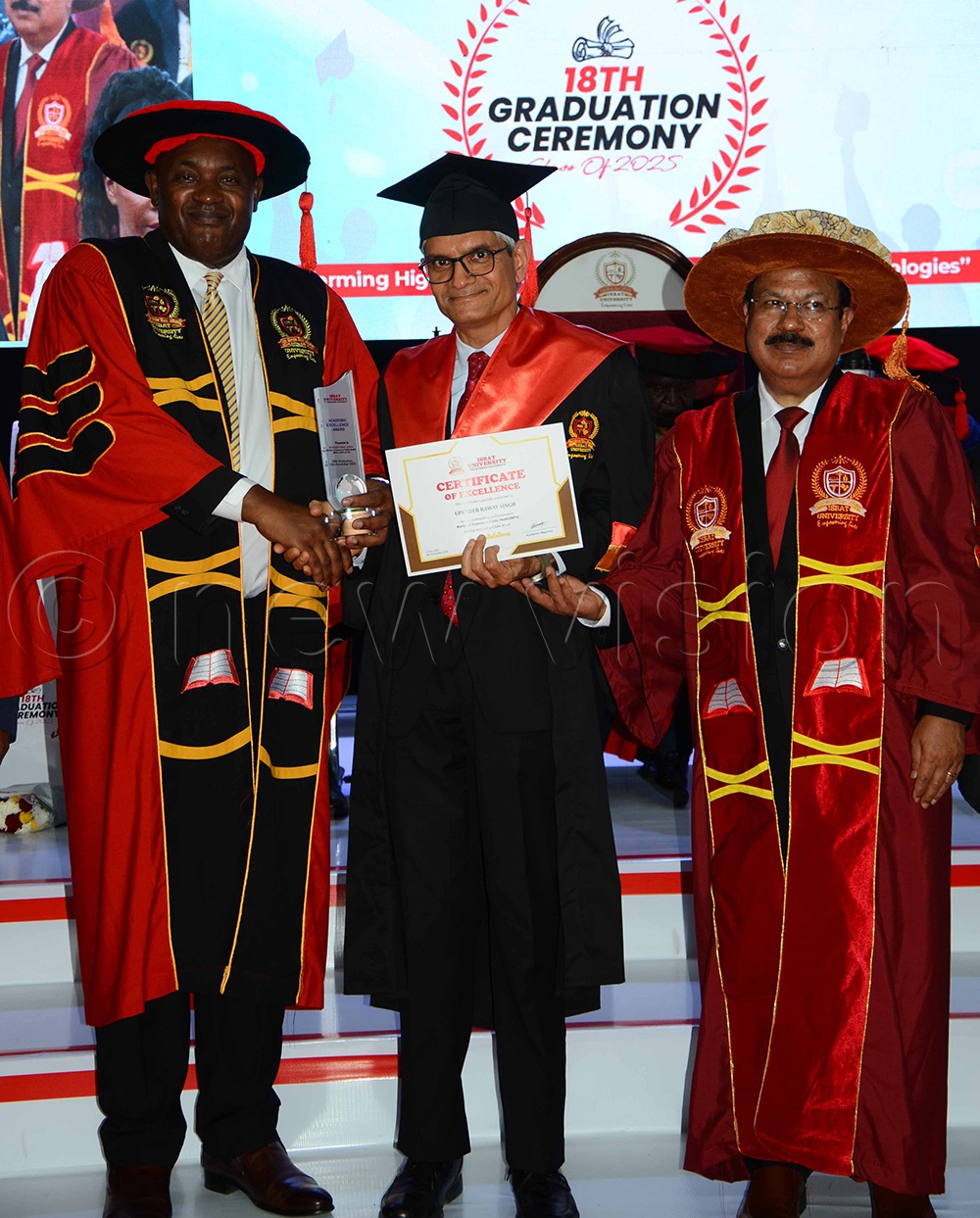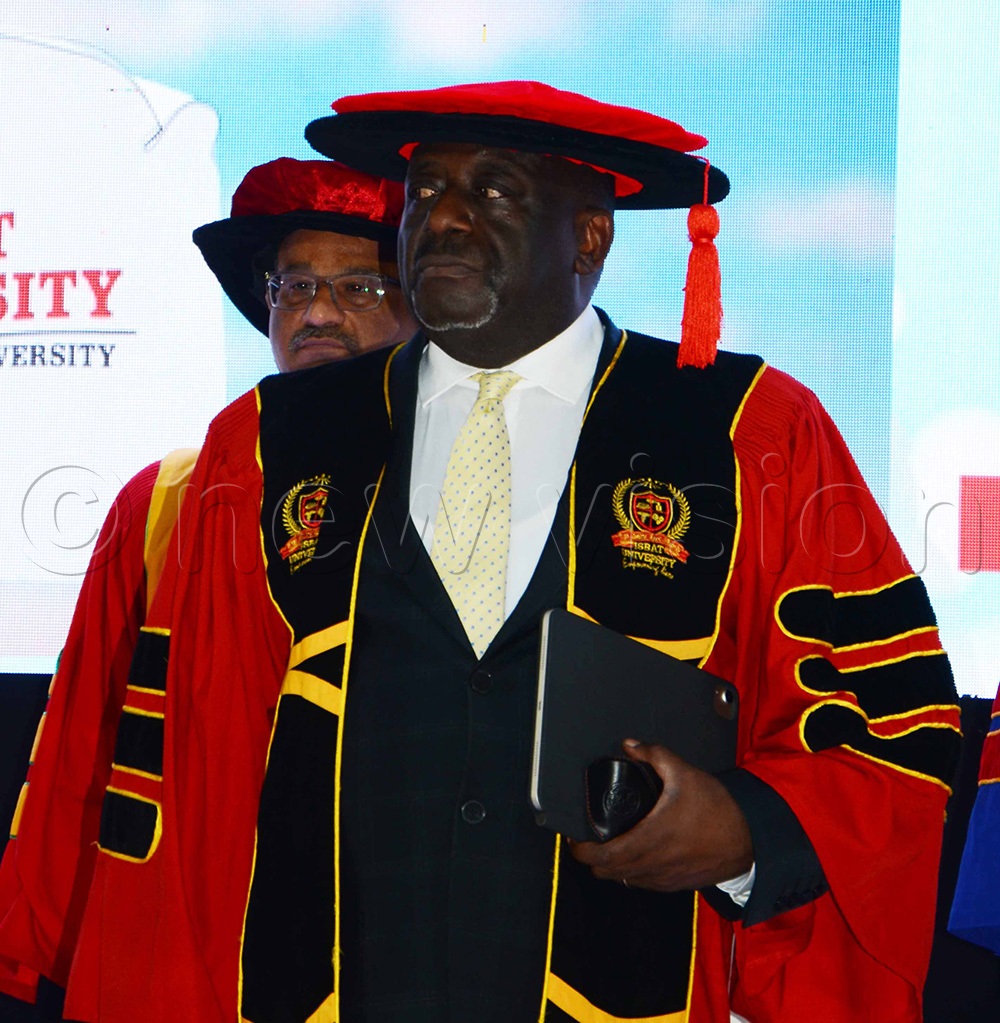Govt assures universities of support in digital transformation
“Our major task as a ministry is to drive the digital transformation agenda in this country. I always tell my audience that the future is digital — in fact, we are now transitioning from digital to intelligence.”
The best students pose for a photo during the ISBAT University graduation. (Photo by Vivien Nakitende)
__________________
Minister of ICT and National Guidance Dr Chris Baryomunsi has assured universities in Uganda of continued government support in their efforts to integrate emerging technologies and promote digital transformation in higher education.
Baryomunsi says the Government remains committed to working closely with institutions of higher learning to build a digitally-empowered society and economy.
He made the remarks during the 18th anniversary and graduation ceremony of ISBAT University in Kampala on Wednesday, November 12, 2025.
L-R: ICT minister Dr Chris Baryomunsi, Ambassador of India to Uganda Upenda Rawat Singh and Varghese Mundamattam, the chairman board, ISBAT University. (Photo by Vivien Nakitende)
“I want to assure you that you will continue to enjoy our support so that you grow from strength to strength,” he said.
“Our major task as a ministry is to drive the digital transformation agenda in this country. I always tell my audience that the future is digital — in fact, we are now transitioning from digital to intelligence.”
The minister said the Government is focused on creating the right environment, policies and infrastructure to help universities, innovators, and young people thrive in this digital era.
Baryomunsi congratulated ISBAT University on reaching 18 years, describing the milestone as a transition into maturity both in governance and academic leadership.
“Just as individuals mature at 18, ISBAT University has also entered adulthood, a phase that comes with responsibility, innovation and broader contribution to national development,” he said.
He lauded the graduates for their perseverance and success, saying their skills are essential to Uganda’s transformation journey. He also extended appreciation to parents and guardians for supporting the students through their education.
“Many of us have been students before, and we understand what it takes to reach this stage,” he said.
“You are graduating at a time when technology is shaping every aspect of life. Use your knowledge to contribute meaningfully to society.”
Highlighting the Government’s achievements in expanding access to higher education, Baryomunsi said Uganda now has 68 universities, both public and private, a major leap from the few that existed when the NRM government came to power.
“This expansion has given thousands of Ugandans, and even non-Ugandans, the opportunity to acquire tertiary and university education,” he said.
Baryomunsi reaffirmed that the Government would continue to strengthen partnerships with universities and the private sector to promote innovation, digital literacy and research that address the country’s development challenges.
“The collaboration between government and universities is crucial if we are to build a knowledge-based economy,” he said.
“We pledge to keep supporting institutions that are transforming higher education through technology.”
Meanwhile, ISBAT University chairperson Varghese Mundamattam urged graduates to use technology as a force for good, applying their knowledge, integrity and creativity to solve real-world problems and build a more humane and equitable society.

Nyombi Tembo, the head of the Uganda Communication Commission, attending ISBAT University graduation. (Photo by Vivien Nakitende)
“The world needs your talent, your integrity and your imagination,” he told the Class of 2025.
“Use the tools you have gained here to create opportunities, not just for yourself but for your communities. Embrace technology as an amplifier of human potential, not a substitute for human judgment.”
Mundamattam encouraged graduates to approach the future with humility, curiosity and a commitment to lifelong learning, saying their success will depend on their ability to adapt, innovate, and make responsible choices.
“Be builders of systems that are fair, resilient and humane,” he said.
“The journey ahead will demand continuous learning and the courage to make hard, ethical decisions, but I have no doubt that you are ready.”
He described the university’s 18-year journey as a symbol of maturity and transformation, reaffirming its commitment to reimagining higher education through the integration of emerging technologies such as artificial intelligence, machine learning, blockchain and biotechnology.
“This year’s theme: Transforming Higher Education through the Integration of Emerging Technologies, is both a mandate and an opportunity to reimagine how learning can evolve, who it serves, and how it prepares students for leadership in a rapidly changing world.”
Mundamattam added that technology must be used not only to drive innovation but also to strengthen communities and support inclusive development.
“As we celebrate your success today, remember that you carry the light that shines through knowledge, wisdom and innovation,” he told the graduates. “May you use that light to transform the world with wisdom, compassion, and creativity.”
A total of 692 students received degrees, diplomas and certificates across various disciplines. Of these, 40 per cent were female, representing 24 countries, with Ugandans making up 75 per cent of the class.
Among the graduands were 25 students who received dual degrees from ISBAT University and UCAM University in Spain.